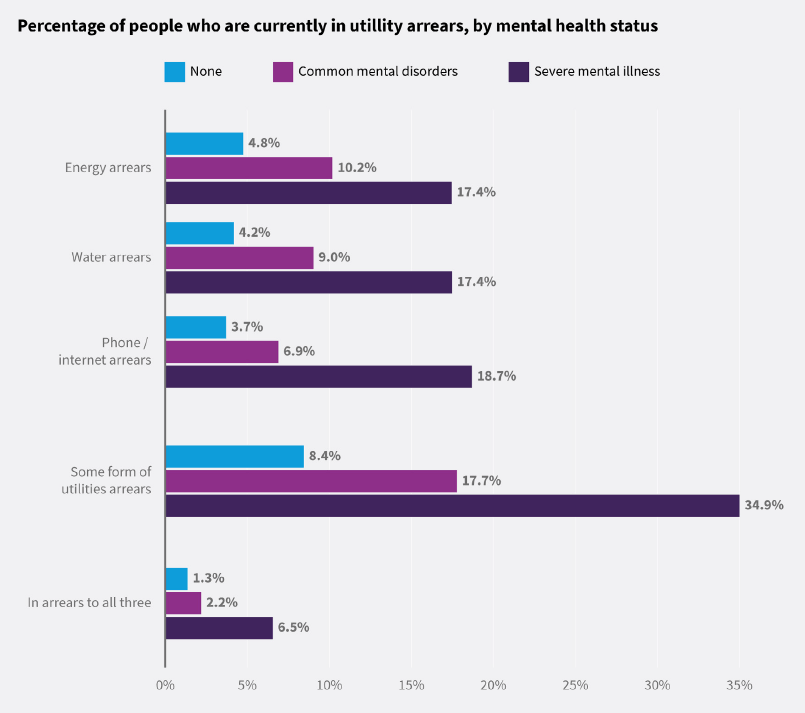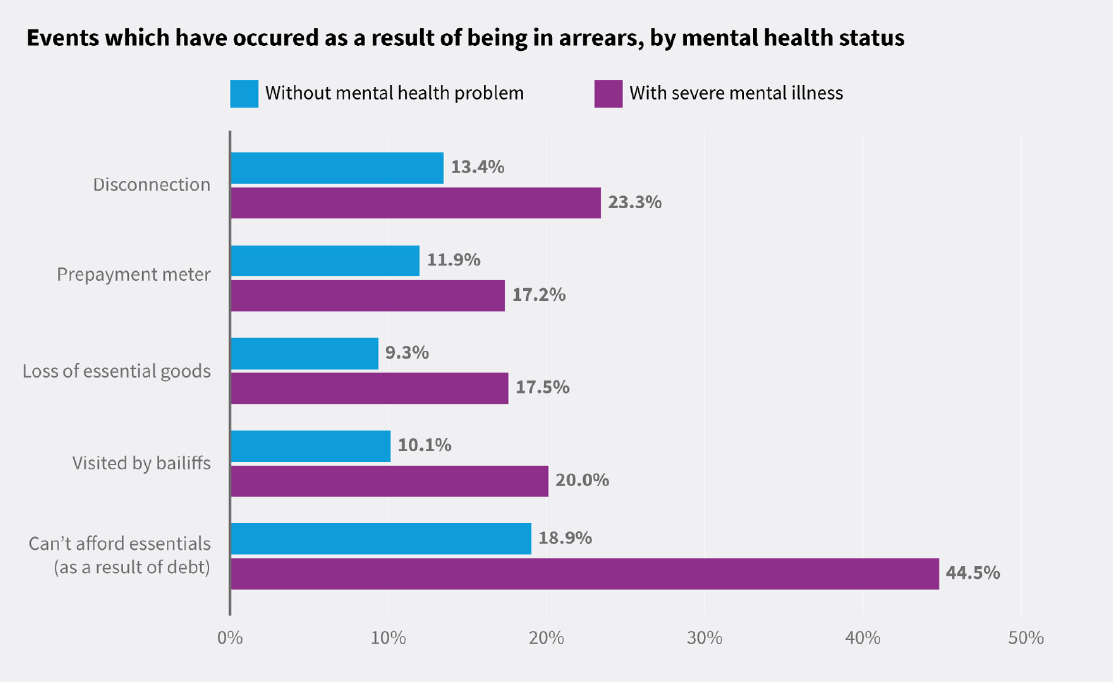
Dan Weir, Research and Policy Manager, Money and Mental Health
Connection lost: unpacking our new research on utilities debt collection and mental health
2 April 2025
- Our new report, Connection lost, finds that debt collection practices by water, energy and telecoms companies are causing significant psychological harms.
- This is especially concerning as our research shows that people with mental health problems are disproportionately likely to be in arrears to utility suppliers, and this likelihood increases for people with several mental illnesses.
- We are calling for regulators and suppliers to take action, strengthening the support available to those in utilities arrears and avoiding harmful practices such as expensive escalation processes and the threat of disconnection.
Access to utilities such as water, energy and telecoms, is vital to maintaining our mental health. Everyone should have a home that is a place of comfort and security. Our homes should be warm and cheerfully lit, our clothes clean and washed, our cupboards well-stocked and our food cooked. We should also be able to keep in touch with friends, family and support networks, as well as just relax in front of the telly, or – these days – a streaming service. We should be able to do all of this undisturbed, without stress and worry.
Real change is needed
Our new report, Connection lost explores how the consequences of falling behind on our bills can deprive us of this essential feeling of security and comfort, causing real psychological harms. We also show that people in debt to an energy supplier are disproportionately likely to have mental health problems, and that the likelihood of being in arrears increases with the severity of the problem. This means utility companies have a real responsibility to ensure their debt collection processes support vulnerable people in financial difficulty.

After years of higher energy prices and a wider cost of living crisis, over 7 million of us are in debt to at least one utility supplier. As our previous reports, Debts and despair, and In the public interest? have shown, common symptoms of mental health problems can make it very difficult to engage with common debt collection processes.
Utility suppliers are highly aware of the need to treat vulnerable customers fairly and sensitively. But Connection lost shows that while there are examples of good practice, in many cases firms’ debt collection processes fall short of the mark.
“The electricity company seemed to send threatening red letters every few weeks. The greatest frustration was that because we had arrears, we were stuck paying way more for our energy with that supplier and unable to move due to our arrears. We couldn’t even switch tariffs.” Expert by experience
Pouring fuel on the fire
Where people are not able to manage their debts, this can have severe consequences. Demands for payment can quickly become distressing, especially where they seem to threaten disconnection from a vital service. Resolution might require complicated, stressful phone calls, which can be very difficult for those of us with mental health problems. This can lead to us feeling pressured into agreeing to unaffordable arrangements or accepting terms that we have not had the opportunity to fully digest.
“I was expected to live on £0. I had to cut even the most basic costs. It’s literally a case of having to beg family and friends for money to buy food. I can’t go anywhere because I can’t afford to travel. I can’t earn money easily as a result. My medical conditions have worsened due to the unremitting stress. It is a continual battle for survival.” Expert by experience
Failure to reach an arrangement can lead to further escalation. The consequences differ from sector to sector, but may include debts being sold to debt collection agencies, mounting fees, legal action, and visits from bailiffs. Each of these comes with additional psychological harms that we have explored in our previous reports. Furthermore, in the utilities sector, being forced onto an energy prepayment meter, or disconnected from our broadband service due to arrears are additional penalties that can cause further hardship.
“I am shaking from the stress of thinking of how this affected me. My debt was passed to a debt collection agency. The stress nearly killed me and in the end I paid my two year telecoms contract in full to calm myself down.” Expert by experience

Taking action
To bring about change, and reduce the psychological harm caused by debt collection we are making the following recommendations:
Ofcom should ensure disconnection only happens as a last resort. To make sure this happens, it should introduce a pre-disconnection protocol, setting out a mandatory number of communications firms should make before disconnection happens, and compelling firms to proactively offer forbearance measures to help customers who are struggling.
All utilities regulators should take action to improve firms’ communications to customers to help recipients access support and engage as necessary. In particular, regulators should mandate that firms avoid using intimidating language and unwarranted threats of disconnection, and instead focus on offering clearer guidance on how customers can get support.
Firms in all utilities sectors should independently take action to introduce supportive measures. This includes taking action to make it easier for people in vulnerable circumstances to disclose their needs, and ensuring communications are accessible and supportive for everyone.
While utility prices have come down, and initiatives such as Ofgem’s recent plans to introduce a debt relief scheme are welcome, people with mental health problems will still remain at greater risk of falling into arrears. It is critical that utilities suppliers do all they can to ensure they support people facing financial difficulty.
You can find out more by reading the full report, Connection lost: Understanding the psychological harm of utilities debt collection and disconnection. We have also published three new best practice guides for debt collection in energy, water and telecoms.
